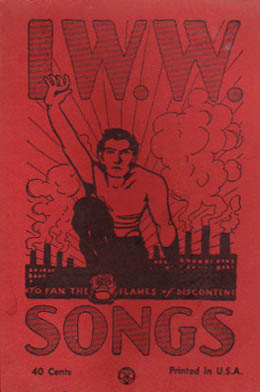In 1909, a committee formed out of Spokane locals of the Industrial Workers of the World (IWW) create the first edition of the IWW songbook. Many Spokane Wobblies (as IWW members are known) are migratory farm laborers and the first edition will have a definite hobo tinge. The "little red songbook" will become immensely popular and go through many editions. It will include "Solidarity Forever" (by Ralph Chaplin), which will become virtually the anthem of the labor movement. It will also include a song later adopted by the 1960s civil rights movement as "We Shall Overcome." The "little red songbook" is still in print today.
Democratic, Radical, and Rowdy
The Industrial Workers of the World was founded in 1905 in Chicago and quickly became influential among lumber industry workers and migratory agricultural laborers in the Pacific Northwest. It was a democratic union with a mix of radical anti-capitalist politics. Rowdy singing, street meetings including speeches and singing, and direct action (civil disobedience) were key Wobbly organizing strategies. Direct action often resulted in being arrested and put in jail, where singing would resume.
J. H. Walsh, West Coast IWW organizer and a Socialist Party member from Alaska, was the prime mover in the creation of the first songbook. It was he who in 1909 urged the Spokane locals to form a committee to create the songbook. Two who joined the effort were Harry McClintock and Richard Brazier, migrant harvesters. Up to this time, IWW songs had been printed on cards or leaflets and passed around.
Dump the Bosses Off Your Back
Many IWW songs were new words put to the tunes of old spirituals or hymns. Wobblies learned the hymns from their streetcorner rivals, evangelists and preachers. The Volunteers of American and the Salvation Army were two frequent competitors. The Wobbly technique was to sing along with a sweet hymn like "Take it to the Lord in Prayer," with the substitute words:
Are you poor, forlorn and hungry?
Are there lots of things you lack?
Is your Life made up of misery
Then dump the bosses off your back.

